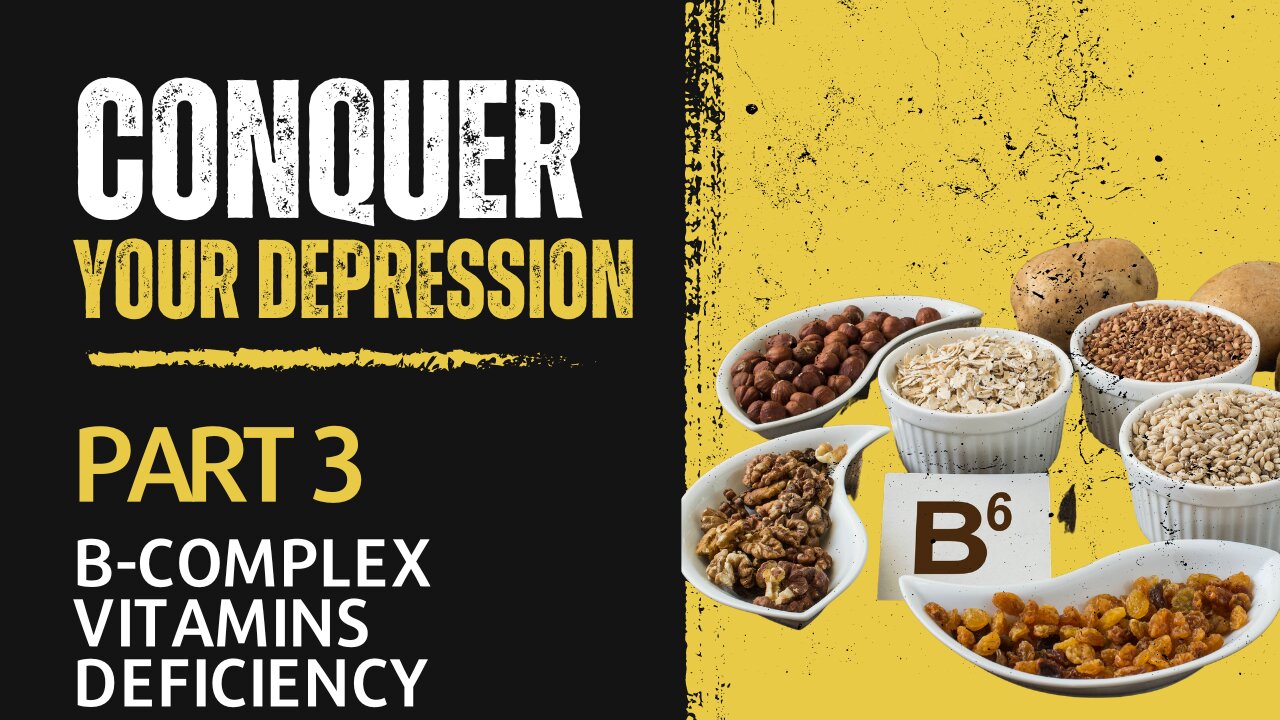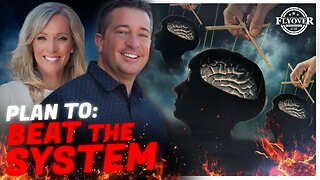Premium Only Content

B-Complex Vitamins Deficiency
If you suffer from chronic depression, your symptoms could be caused by a combination of factors.
One of these potential causes is a deficiency in one or more essential nutrients.
This could be fantastic news, because simple dietary changes, in addition to medication and therapy, may help you feel better. We're not suggesting you avoid taking medication.
Remember that vitamins and minerals derived from whole foods, rather than pills, are the most beneficial to the body.
Only a doctor can tell you if you have a nutritional deficiency, so get a formal diagnosis before stocking up on supplements or trying new foods.
B-complex vitamins are necessary for mental and emotional health.
Because they are water-soluble, they cannot be stored in the body and must be obtained through the foods you eat daily.
Vitamin B1 - Thiamine
Vitamin B1 is used by your brain to aid in the conversion of glucose, or blood sugar, into fuel.
Without it, the brain quickly loses energy.
Thiamine deficiency is uncommon, but it can cause a variety of disorders, including irritability and depression symptoms.
According to one study, thiamine supplements may help people with major depressive disorders overcome the time lag caused by antidepressants.
Vitamin B3 (Niacin)
Vitamin B3 deficiency can cause agitation and anxiety, as well as mental and physical slowness.
Vitamin B5 ( Pantothenic Acid)
Vitamin B5 deficiency is uncommon, but it can cause fatigue, depression, insomnia, skin irritation, and numbness and tingling in the hands and feet.
Vitamin B6 (Pyridoxine)
Pyridoxine is required for the synthesis of serotonin, melatonin, and dopamine.
Many nutritionists believe that most diets do not provide adequate amounts of this vitamin.
Vitamin B6 deficiencies, although very rare, cause mental confusion.
Vitamin B12
A lack of vitamin B12 can cause a variety of neurologic and psychiatric symptoms.
Because vitamin B12 is required for the formation of red blood cells, a deficiency can result in anemia.
Thank you for watching.
We have shared the links to the studies below in the description. But first, if you are serious about improving your nutrition, please check out our affiliate partners:
The US Army’s Forgotten Food Miracle: https://tinyurl.com/lostfoodonrumble
Get the VegHealth Nutrition Mastery Program!https://tinyurl.com/veganonrumble
Studies featured in the video:
Thiamin: Fact Sheet for Health Professionals. National Institutes of Health Office of Dietary Supplements: https://ods.od.nih.gov/factsheets/Thiamin-HealthProfessional/
Niacin: Fact Sheet for Health Professionals. National Institutes of Health Office of Dietary Supplements: https://ods.od.nih.gov/factsheets/Niacin-HealthProfessional/
Pantothenic Acid: Fact Sheet for Health Professionals. National Institutes of Health Office of Dietary Supplements: https://ods.od.nih.gov/factsheets/PantothenicAcid-HealthProfessional/
Vitamin B6. National Institutes of Health Office of Dietary Supplements: https://ods.od.nih.gov/factsheets/VitaminB6-HealthProfessional/
Vitamin B12. National Institutes of Health Office of Dietary Supplements: https://ods.od.nih.gov/factsheets/VitaminB12-Consumer/
-
 1:15:45
1:15:45
Roseanne Barr
7 hours ago $19.74 earnedJFK case solved!? with Shane Stevens | The Roseanne Barr Podcast #85
75K46 -
 10:36:04
10:36:04
Dr Disrespect
13 hours ago🔴LIVE - DR DISRESPECT - PUBG - WHAT WINNING LOOKS LIKE
233K36 -
 4:41:07
4:41:07
Nerdrotic
10 hours ago $28.88 earnedCap 4 and Emelia Perez BACKLASH! Acolyte is Still CANCELED! Hollywood STFU | Friday Night Tights 339
176K30 -
 57:41
57:41
The StoneZONE with Roger Stone
6 hours agoWhy Are They So Afraid of Tulsi Gabbard? | The StoneZONE w/ Roger Stone
40.3K8 -
 2:41:03
2:41:03
I_Came_With_Fire_Podcast
11 hours ago🔥🔥Suing CHINA, Hillary AIDED RUSSIA, and DEI REMOVED from Military🔥🔥
47.5K5 -
 LIVE
LIVE
SoniCentric
12 hours agoCozy Up With SNOWY Lakeside Cabin Jazz Vibes
163 watching -
 1:36:16
1:36:16
PMG
1 day ago $0.34 earnedSPECIAL: JUSTICE FOR JEREMY - NOW!
20.3K3 -
 1:01:01
1:01:01
TheTapeLibrary
14 hours ago $2.30 earnedThe Horrifying True Story of Summerwind Mansion
32.6K5 -
 29:28
29:28
Afshin Rattansi's Going Underground
1 day agoMax Blumenthal on US’ Ukraine Aid Corruption, 'Psychotic' Israel Turning the West Bank into Gaza
38.7K4 -
 57:12
57:12
Flyover Conservatives
1 day agoCovid, Control, & Corruption —Dr. Stella Immanuel’s Plan to BEAT the System! | FOC Show
26.3K